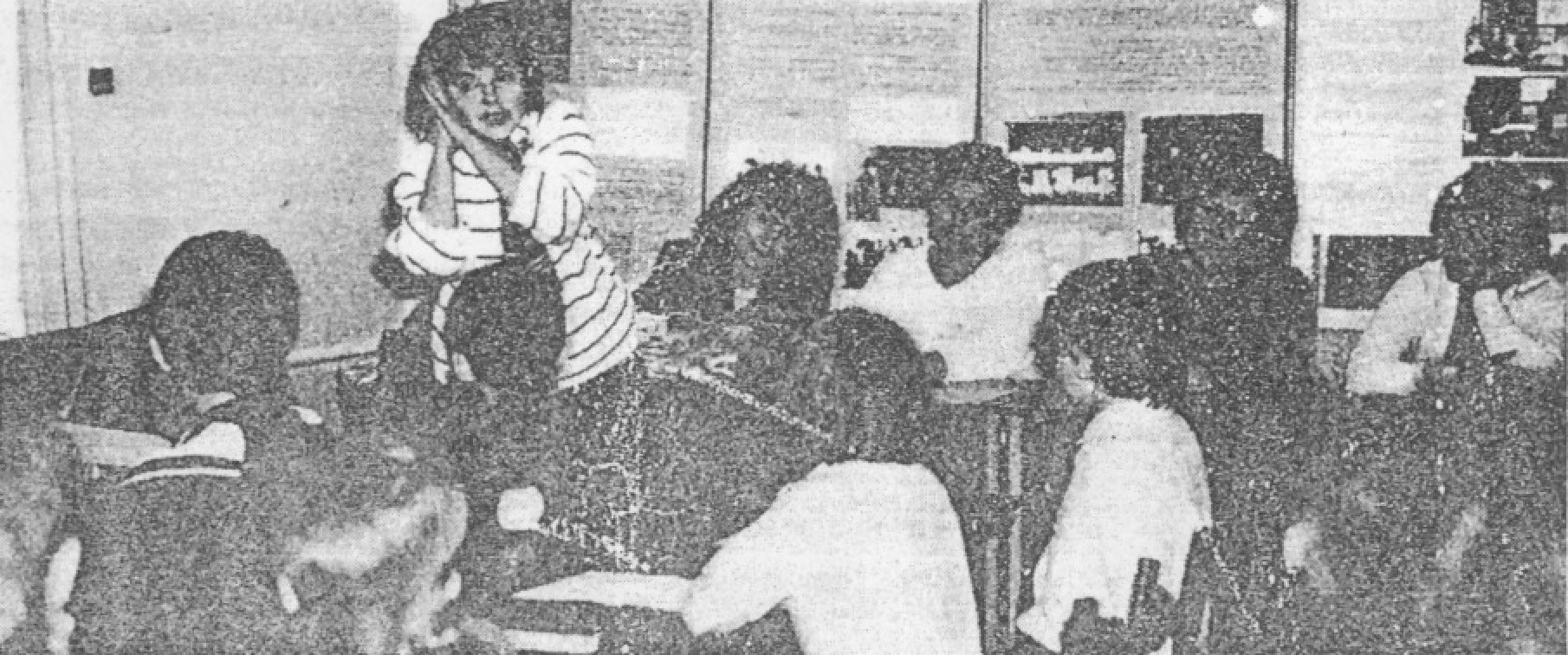Главная
Об этом сайте
Немного о себе
Стихи
Книги
Одна пьеса
Сказочный английский
Выступления
Интервью
Для газет1990 A story about storytelling
1991 Over here
1991 How to tell tall stories
1991 Empty shelves and English
1992 Storytelling in practice
1996 "- Закройте за мной рот!"
1997 "- Вы обозвали меня поэтессой?"
1998 "-Я всех люблю, и мне всех очень жалко"
1999 О Ренате, Мухармсе и платке хоботовом
2004 Рената Муха: начало следует..
2005 Птичьи права: прыгнуть с парашютом вверх...
На телевидении
На радио
Что было в газетах
Глазами друзей

Paul Gander Empty shelves and English Русский перевод читать здесь. EFL Gazette, May 1991
“HEAR and attend and listen, for this befell and behappened and became and was when all the tame animals were wild…” Renata Tkachenko launches into one of her stories, this one from Kipling, which she uses to teach English and literature to children and adults in the Ukraine.

Mrs Tkachenko is Assistant Professor in the English Department at Kharkhov University. Her particular interests in language and literature teaching have led her to a form that she has made her own storytelling. She began using stories in class 20 years ago, not with children but with her university students. It is a form that lends itself to her wit and enthusiasm, as well as to a more general lack of sophisticated materials.
In a visit to the offices of the EFL Gazette Mrs Tkachenko explained why storytelling works for her. She said: “The choice of the story is of crucial importance.” She favours Kipling’s Just So Stories because there is so much repetition. She insists that this is ”interactive storytelling”, where the teacher gradually steps aside and the class takes over.
Here she holds an audience of Kharkov schoolchildren and parents spellbound.
NOBODY can stand in two queues at the same time. This is perhaps the only reason why the Soviets are not queuing up for foreign languages: bread takes priority.
Of course, as anyone will tell you, the demand for English is huge; it has been since before the beginning of Perestroika and is still on the increase. But nowhere is there a wider gap between wanting to learn and being able to. Currency problems, general economic problems, a lack of materials, and a dearth of language schools with mother tongue teachers are all obstacles to learning.
The USSR has not attracted international EFL organizations in the way that Czechoslovakia or Hungary have. Bell have opened schools in Prague and Budapest, but not in Moscow. They considered setting up their own schools or affiliating with existing institutions, but now plan to do neither for the foreseeable future.
Recent political and economic events in the URRS have discouraged all types of western investment. International House have an affiliate school in Tbilisi, Georgia, where they held a conference in November last year. They have also linked up with the Department of Foreign Languages at Moscow State University. But as Cathy Connolly of IH told the Gazette: “We won’t be sending out large numbers of teachers because the situation in the URRS is so unsettled.”
According to Ms Connolly, many enthusiastic teachers have no idea just how difficult conditions are in the USSR. Unlike the Soviets themselves, young teachers would be without family support, paid in roubles and working under “virtually volunteer conditions”. IH plan greater cooperation in teacher training: trainers will be sent over to the URRS and trainees may be invited to visit Britain.
Renata Tkachenko confirms that the only westerners likely to teach in the USSR are those who want to learn the language, since they would be paid in roubles. She told the Gazette that the British Council were planning to send language experts to lecture in the USSR.
According to Mrs Tkachenko, 70 per cent of Soviet state schools teach English. Usually this begins at 10 but the tendency is to start earlier – sometimes as early as six. Recently a new type of school has appeared at secondary level, the equivalent of a lycee, where there is far more freedom in choosing the syllabus and methodology than in traditional schools. In these lycees more emphasis is put on foreign languages.
A few privileged children at secondary level are able to go to the Special Language Schools. More attention is paid to one specific foreign language and this type of school turns out good linguists.
Intensive language courses are very popular, according to Mrs Tkachenko. They tend to use suggestopoedia, a very commonly used method in Eastern Europe.
Other observers see a boom in home-grown TEFL in the USSR. John Langran of Birmingham’s Brasshouse Centre has organized courses for Soviet businessmen at his school, and has recently visited the USSR to explore ways of working more closely with the country. He told the Gazette: “There is a huge boom in EFL in small cooperatives. The demand is tremendous”.
New businesses of all sorts have opened since the go-ahead was given for the setting up of private enterprise. An estimated hundred small companies are opening every month. Dealing in computers and teaching languages are currently in vogue.
Most of the new language schools are appearing in the largest cities, Moscow and Leningrad, and have kept to the cooperative structure where profit (or loss) is shared. Whereas courses abroad or through foreign organizations have to be paid for in hard currency, these schools are within the means of language learners.
For the business sector it is very often the company which takes an interest in language needs and is able to finance them, sometimes sending employees to the West for courses.
